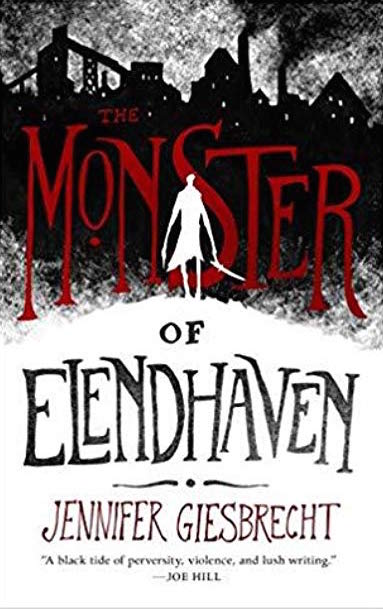The Monster of Elendhaven reminds me of a lot of things, but nothing so much as a cup of tea, unmitigated by milk or sweetness, perfectly bitter, so strong that it makes you rush and jitter to drink it to the dregs in one go. And at the bottom, vague portents spelled out in the murk, all of them doom.
Jennifer Giesbrecht has brewed a twisted tale, dark and dramatic tale steeped to blackness in myth of her own invention. It’s wonderfully grim, and the aftertaste lingers long after its brief pages are through. I had the good luck of reading it all at once on a rainy night, journeying with its two evil “protagonists” from their corpse-strewn beginnings to their wicked ends.

Neither Johann nor Florian are heroes, nor are they even antiheroes. They’re bad guys through and through, resisting our every attempt at sympathy, eager to kill and even to bring about the end of the world. Even their mutual affection is laced with violence and control, less a matter of love and more a matter of desperation. Florian is physically weak and needs Johann to carry out the more demanding aspects of his plans. Johann goes along with it because Florian is one of the few people who can really see him—those without magic experience him as a shadow, or as a discomfort they’d just as soon forget. Their relationship reminds me strongly of Exquisite Corpse, the classic (if underappreciated) horror novel by Poppy Z. Brite about romance between two serial killers.
But although the characters are Brite-esque, the setting is far more Shirley Jackson. The decrepit mansion has strong notes of We Have Always Lived in the Castle, since Florian lives in only a few rooms and dwells endlessly on the faded glory of his family, while outside the whole town vacillates between pitying and abhorring him. But unlike the dubiously magical Merricat, Florian really is a sorcerer. And his murderous impulses encompass the whole of Elendhaven.
It’s said in the book’s weird mythos that Elendhaven is where the end of the world will begin, and Giesbrecht’s writing certainly makes me believe it. A gloomy, run-down city full of cutpurses and cutthroats, it rises from her prose like an abomination from the sea, fully formed and terrifying. Watching Florian and Johann try to ruin it entirely is an exercise in sick fascination, like watching a natural disaster unfold.
Though it’s certainly not a feel-good story, it will leave you with a sense of satisfaction nonetheless. Too much of horror ends in triumph or coyness, with evil vanquished—or is it!? (Cue dramatic sound effect.) Sometimes those solutions work, but often they’re compromises, flinches at the last moment in order to make the story either more or less frightening. Not so here, with a wretchedly fitting end for all—Florian, Johann, the secondary characters, and the entire city. Quite a feat for a 150-odd page book, but Giesbrecht pulls it off with élan. Everything about this book is hideously polished, horribly wicked, and darkly delightful. It’s the perfect book for curling up with a cup of tea, a bucket of candy, and a grim determination to scare the neighbors on Halloween night. Or any other night, if you’re so inclined.
The Monster of Elendhaven comes out September 24th.
